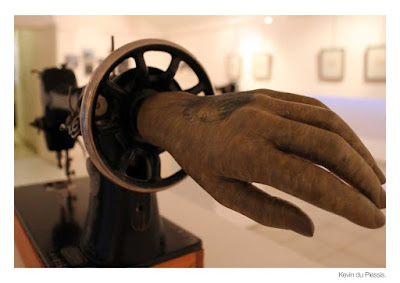 |
Ann-Marie Tully, The turn of instrumental reason: A song for
/Han≠lass’o, 2014. Antique Singer sewing machine, mannequin hand,
& oil paint. (H) 400mm x (W) 380mm x (D) 200mm
|
 |
Ann-Marie
Tully, The turn of instrumental
reason: A song for /Han≠lass’o, 2014.
North West University Botanical Garden Gallery, Wolf in sheep's clothing installation
view. Antique Singer sewing machine, mannequin hand, & oil paint.
(H) 400mm x (W) 380mm x (D) 200mm
|
 |
Ann-Marie Tully, The turn of instrumental reason: A song for /Han≠lass’o, 2014.
North West University Botanical Garden Gallery, Wolf in sheep's clothing installation
view. Antique Singer sewing machine, mannequin hand, & oil paint.
(H) 400mm x (W) 380mm x (D) 200mm
|
 |
Ann-Marie Tully, The turn of instrumental reason: Harried work (Lucy
Lloyd), 2014. Antique Swift sewing machine, mannequin hand, &
oil paint. (H) 400mm x (W) 380mm x (D) 200mm.
|
 |
Ann-Marie Tully, The turn of instrumental reason: Harried work (Lucy Lloyd), 2014.
Antique Swift sewing machine, mannequin hand, & oil paint. North West University
Botanical Garden Gallery, Wolf in sheep's clothing installation view.
(H) 400mm x (W) 380mm x (D) 200mm.
|
 |
Ann-Marie Tully, The turn of instrumental reason: Harried work (Lucy
Lloyd), 2014. Antique Swift sewing machine, mannequin hand, & oil
paint. North West University Botanical Garden Gallery, Wolf in sheep's
clothing installation view. (H) 400mm x (W) 380mm x (D) 200mm.
|
 |
Ann-Marie Tully, The turn of instrumental reason: Stanley, Kalulu, & Leopold (keeping up
with the Jonses), 2014. Antique Jones sewing machine, mannequin hand, & oil paint.
(H) 250mm x (W) 500mm x (D) 350mm.
|
The turn of instrumental reason (series)
Ann-Marie Tully
The Turn of instrumental reason (2014) series of altered sewing machines relates to the marginalisation and animalisation of !Xam speakers. These mechanical and kinetic assemblages feature paintings on the palms of the ‘grafted-on’ hands of human, animal and therianthropic forms drawn from San rock paintings, and images of individuals from the colonial African stage; in particular referencing the Bleek family, who hosted a group of !Xam speakers incarcerated at the Breakwater prison. The Bleek family conducted research into the !Xam and Korana language compiling detailed records of San folklore and cosmological beliefs.
Further to this narrative element the spliced ‘machine arm’ and hand evokes the violent stitch of the sewing machine (with monstrous surgical inference); industrialisation (the product of enlightenment thinking); histories of western dominance and exploitation; the punitive violence perpetrated in the name of industry and colonial expansion.
Also significant is the coupling of the feminine hands with the feminine ergonomics of the sewing machines. This is suggestive of the female hands, that these well-worn objects (haunted by the mark of past users) were designed to respond to and enspan. The presence of animal forms on the palms of the hands alludes to the rationalised binary opposition of nature and culture/industry; and the prejudicial association of women with the ‘lesser’ form of nature. The ancient and organic animal signifiers painted on this incongruous and monstrous mechanical device (industrial cyborg) alludes to the destruction and brutal exploitation of nature by the ‘wheels of industry’. The viewers complicity in this cycle is underscored by their ‘turn of the wheel’.
These works employ Ball and Claw tables as plinths to emphasise the domestic sphere of the sewing machine; where the discourses that fuel human repression of, and disentanglement from the non-human world are forged.





